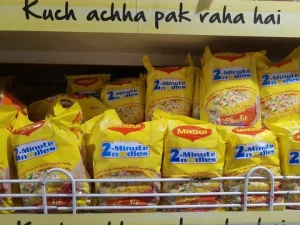Jnanendra Das revisits the sentimentality associated with instant noodles, Maggi; how it formed an integral part of one’s growing years and continues to be present in new avatars.
 When it comes to instant noodles, Maggi remains undefeated despite numerous new brands entering the market. This quick meal was introduced at a time when Indian consumers didn’t know much about noodles, let alone instant ones. Back in the 1980s, when Nestle launched Maggi in India, the yellow-colour packets that remain to this day, resonated with the vast culinary diversity that is India. Maggi is not Indian and it took time before it became a household common. This reminds us of our childhood, of our school lunch break, where the noodles cooked by our mother in the morning would take the shape of the tiffin box, to some, it still is a saviour in hostels and dorms or when there is nothing in the house to eat. How does Maggi maintain its popularity even after some regulatory setbacks and how does Meghalaya consume Maggi? Sunday Shillong explores the fondest Maggi memories, its iconic jingle, and the pop culture behind it.
When it comes to instant noodles, Maggi remains undefeated despite numerous new brands entering the market. This quick meal was introduced at a time when Indian consumers didn’t know much about noodles, let alone instant ones. Back in the 1980s, when Nestle launched Maggi in India, the yellow-colour packets that remain to this day, resonated with the vast culinary diversity that is India. Maggi is not Indian and it took time before it became a household common. This reminds us of our childhood, of our school lunch break, where the noodles cooked by our mother in the morning would take the shape of the tiffin box, to some, it still is a saviour in hostels and dorms or when there is nothing in the house to eat. How does Maggi maintain its popularity even after some regulatory setbacks and how does Meghalaya consume Maggi? Sunday Shillong explores the fondest Maggi memories, its iconic jingle, and the pop culture behind it.
The Origin, Jingle, and Popularity
 Maggi’s journey began in the Swiss mountains in 1884 when Julius Maggi created a nutritious powdered soup for busy working families. Nestlé acquired the brand in 1947 and launched the “2-minute noodles” in India during the 1980s. Emotional advertising played a crucial role in making this foreign concept appealing. The 1982 ad, directed by Prahlad Kakkar, featured the memorable “Maggi, Maggi, Maggi!” jingle, connecting the product to a mother’s touch (Our Stories: Nestle India and Caribbean). This jingle, adapted from the 1949 song “Music! Music! Music!” by Stephen Weiss and Bernie Baum, was translated into multiple Indian languages, becoming a cultural staple (National Public Radio, “Songs Of Remembrance”: USA).
Maggi’s journey began in the Swiss mountains in 1884 when Julius Maggi created a nutritious powdered soup for busy working families. Nestlé acquired the brand in 1947 and launched the “2-minute noodles” in India during the 1980s. Emotional advertising played a crucial role in making this foreign concept appealing. The 1982 ad, directed by Prahlad Kakkar, featured the memorable “Maggi, Maggi, Maggi!” jingle, connecting the product to a mother’s touch (Our Stories: Nestle India and Caribbean). This jingle, adapted from the 1949 song “Music! Music! Music!” by Stephen Weiss and Bernie Baum, was translated into multiple Indian languages, becoming a cultural staple (National Public Radio, “Songs Of Remembrance”: USA).
Where is Maggi Today?
 For many, Maggi is still a go-to comfort food. Poirieitomba Huidrom, a 25-year-old alumnus of B. K. Bajoria School now living in Bengaluru, relies on Maggi as his last resort on days he doesn’t want to cook, often craving it with fried eggs. Neonette Sharon Hynniewta, 22, from Nongshilliang, Nongthymmai in Shillong, fondly remembers carrying Maggi to school for tiffin, preferring it over rice. She believes the noodles tasted better when they cooled down and took the cakey shape of her lunchbox. Lalruatfeli, 22, from Mizoram, believes Maggi has an unforgettable taste. She enhances her noodles by adding onion and garlic oil, which she says elevates the flavour.
For many, Maggi is still a go-to comfort food. Poirieitomba Huidrom, a 25-year-old alumnus of B. K. Bajoria School now living in Bengaluru, relies on Maggi as his last resort on days he doesn’t want to cook, often craving it with fried eggs. Neonette Sharon Hynniewta, 22, from Nongshilliang, Nongthymmai in Shillong, fondly remembers carrying Maggi to school for tiffin, preferring it over rice. She believes the noodles tasted better when they cooled down and took the cakey shape of her lunchbox. Lalruatfeli, 22, from Mizoram, believes Maggi has an unforgettable taste. She enhances her noodles by adding onion and garlic oil, which she says elevates the flavour.
Maggi and Health
 Health concerns have shadowed Maggi, particularly during its 2015 ban due to high traces of MSG and lead. Despite the availability of healthier alternatives like millet noodles, Adriana Wahlang Syiemlieh, 23, from Nongmynsong, still prefers the classic “two-minute noodles.” She adds vegetables to her recipe as a hack and mentions that reducing the masala content helps avoid dehydration. After the 2015 ban, Maggi relaunched with stricter production processes and safety standards, regaining consumer trust.
Health concerns have shadowed Maggi, particularly during its 2015 ban due to high traces of MSG and lead. Despite the availability of healthier alternatives like millet noodles, Adriana Wahlang Syiemlieh, 23, from Nongmynsong, still prefers the classic “two-minute noodles.” She adds vegetables to her recipe as a hack and mentions that reducing the masala content helps avoid dehydration. After the 2015 ban, Maggi relaunched with stricter production processes and safety standards, regaining consumer trust.
A Part of Childhood
 Maggi’s impact on childhood is unforgettable. Neonette misses the days of having evening tea with her cousins, where they would share and sometimes fight over Maggi. Adriana fondly recalls the puzzles that came with Maggi packets, enjoying the challenge of solving them. These memories highlight Maggi’s role in creating lasting bonds and cherished moments.
Maggi’s impact on childhood is unforgettable. Neonette misses the days of having evening tea with her cousins, where they would share and sometimes fight over Maggi. Adriana fondly recalls the puzzles that came with Maggi packets, enjoying the challenge of solving them. These memories highlight Maggi’s role in creating lasting bonds and cherished moments.
The Unforgettable Taste
 The debate continues about what makes Maggi’s taste so unforgettable. Is it the unique spice mix or the “love, love, love” that goes into its preparation? Regardless, Maggi remains a beloved comfort food. Neonette advises health-conscious fans to enjoy Maggi sparingly, perhaps once or twice a month. Despite the rise of other brands, Maggi’s loyal fans appreciate its reliability, especially during late-night hunger pangs or when you are broke.
The debate continues about what makes Maggi’s taste so unforgettable. Is it the unique spice mix or the “love, love, love” that goes into its preparation? Regardless, Maggi remains a beloved comfort food. Neonette advises health-conscious fans to enjoy Maggi sparingly, perhaps once or twice a month. Despite the rise of other brands, Maggi’s loyal fans appreciate its reliability, especially during late-night hunger pangs or when you are broke.
 In conclusion, Maggi’s journey from a foreign concept to an integral part of Indian culinary culture is a testament to its adaptability and emotional resonance. Whether it’s the nostalgic memories or the distinctive taste, Maggi continues to hold a special place in the hearts of many.
In conclusion, Maggi’s journey from a foreign concept to an integral part of Indian culinary culture is a testament to its adaptability and emotional resonance. Whether it’s the nostalgic memories or the distinctive taste, Maggi continues to hold a special place in the hearts of many.
Please note: This is not a promotional article for Maggi, and we do not endorse the product. The focus of the article is solely on the nostalgic aspect associated with it.



